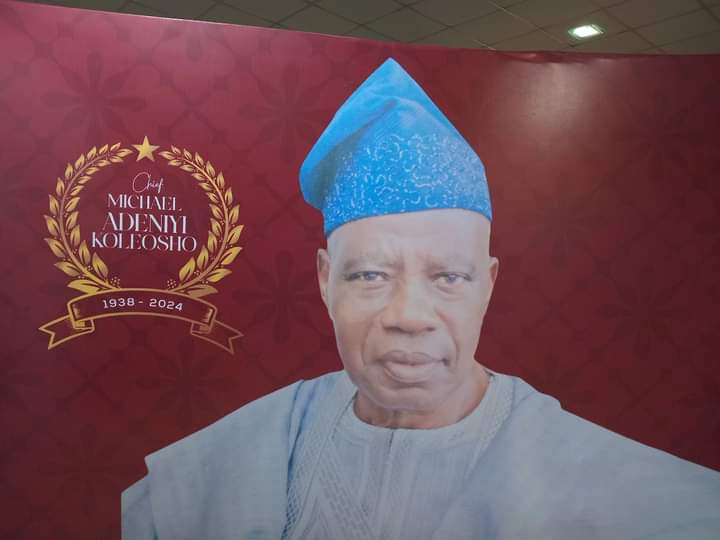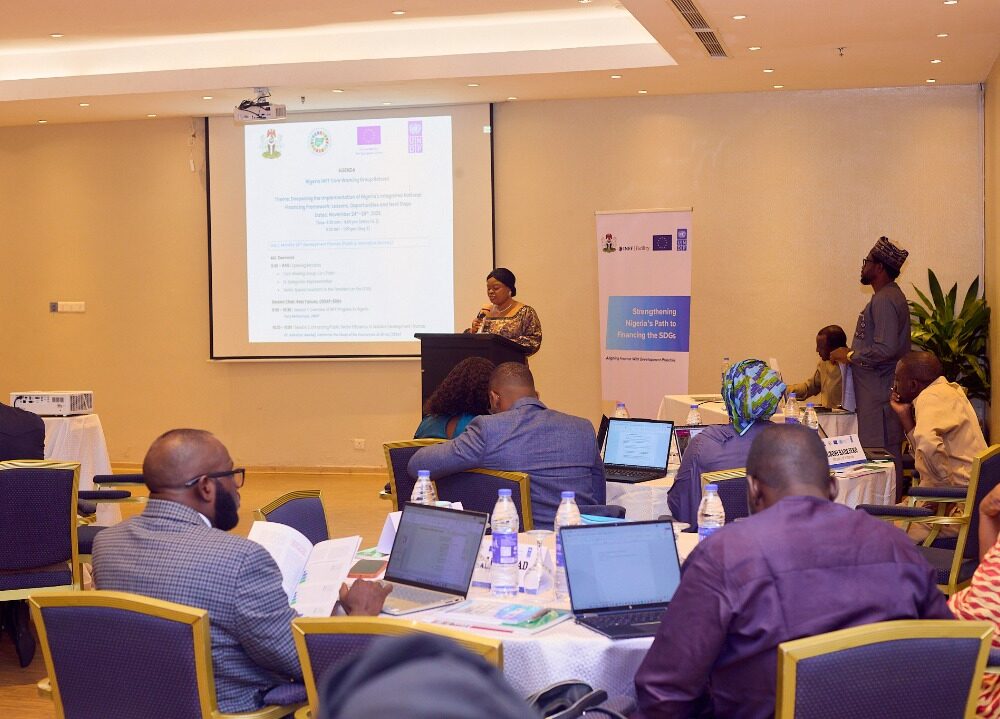Today, Saturday 19 October, 2024, the body of Chief Michael Adeniyi Koleosho, popularly known as Babalaje in Oyo State political circle, was committed to mother earth. Today, the soil of Saki, a border town of which he was unarguably the most consequential political mascot for about half a century, opened its arms and received the remains of Babalaje into its bosom as an eternal consort.
A couple of days after Koleosho breathed his last on September 2, 2024, the paramount ruler of Oke-Ogun and the Okere of Shaki, Oba Khalid Ayinla Ilugbemidepo Oyedepo 111, paid glowing tribute to him in his Ibadan home. In a very pensive and sober voice, Kabiyesi made a very profound encapsulation of what Koleosho stood for. The whole Oke-Ogun was in a mourning mood, having lost its greatest leader ever, he said. Oke-Ogun was not sure if anyone could fill his over-sized shoes, he pursued further. By the time he was making his earthly exit that Monday afternoon, Koleosho had risen through the ranks into becoming one of the most respected political icons of his state.
Born on April 30, 1938 to Pa Samson Ojo Alaiyaki and Comfort Subulade Gbogbolomo Koleosho, in the Emi Abata family in Kinikini, Saki and Baba Elegun compound of Saki respectively, the man who was to later rise to become a colossus in Oyo State politics first began on the route of life as a sawyer and then farmer. The elder Koleosho hailed from an Egungun worshippers’ lineage but converted to Christianity. Similar to his, his wife also hailed from a prominent masquerade worshippers’ family in Saki. The couple eventually became very staunch Christian worshippers. So beloved by his parents, Michael’s father once went to his school to plead with his teacher who had earlier given him a lacerating beating to find other means of punishing his son for reasons he didn’t state. After the teacher beat Michael in class, his cry lingered till he got home in the evening. Michael and his father also had such a chummy relationship that he had to wring the promise of buying him a Rudge bicycle if his father wanted Michael to attend the Local Authority Modern School.
Early in life, the young Michael discovered an excruciating pain on his chest. It was so severe that he had to journey all the way from Saki to the University College Hospital to consult a specialist. The specialist then recommended surgery. Michael’s brother, Olabode, who coincidentally came home got wind of the unbearable pain he was passing through and the doctor’s recommendation of going under a surgical knife. In a counsel which the young Michael believed was his life-safer, Olabode urged him against the surgery and suggested that being a young boy, the pain would melt of its own accord as he advanced in age. Michael believed this was God in action and that the surgery could have led to his death.
In 1956, young Michael took up a teaching appointment at Ogboro Local Authority Primary School as a pupil teacher. Between 1957 and 1961, he was also at the prestigious Olivet High School where he was classmate to the late Chief Harry Akande while Chairman of Honeywell Group, Oba Otudeko, was senior to both of them. Anyone who wondered why, later in life, the now man Koleosho was stern in articulating what he believed in and never wavered on the path of integrity and principle, may not know that this dated far back. An incident which happened while he was a student of Olivet would seem to have made him to always wear his integrity as his imprimatur. The school principal had contracted the supply of bread to his own in-law who in turn was shortchanging the students by supplying low-quality bread. Koleosho had confronted the supplier to tell him of his unfair treatment of the students. When the principal head of the young boy’s impudence, he summoned Koleosho, got him tongue-lashed and thereafter began a witch-hunt which he couldn’t hide. Rather than deter him, the young Michael resolved to continue on this path and never to compromise his principle. All through his adulthood, Koleosho never hid behind a finger and was famous for saying it as it was, even as a politician. From a teaching appointment at Progressive Modern School, Tede in 1962, fate eventually took the young man to the School of Hygiene, Eleyele, Ibadan where he graduated in 1964 and wrote the Royal Society of Health examination.
Koleosho’s fidelity was to be tested upon graduation from the School of Hygiene. The Western Region government had offered him employment at its Ministry of Health. He however insisted on returning to his local government in Saki which sponsored his education to the school. This was what birthed his first work at the Saki District Council in 1965 as Public Health Inspector. He left the department in December 1975 and went into business. Koleosho had over the years found out that he had a business acumen which, if he focused on it, would make him a successful businessman. For instance, while a teacher at Ogboro, he found time to sell games like antelope and grasscutters while re-bagging foodstuffs like yam flour. He bought them in Ogboro and sold at Saki where he discovered they were costlier. He made so much success of the business that, by the end of 1976, a year after leaving the civil service, he had earned his first million naira. He then veered into beer distributorship, also becoming a distributor to G.B. Ollivant, John Holt, PZ, UACN and Portland Cement. He attributed this financial success early in life to recognizing opportunities and over and above this, the grace of God.
The October 1 Independence Day Celebration in Saki, unbeknown to him, was to bring his heartthrob, Esther Aduke Mopelola. A ward maid and a teacher, she had contested at that anniversary programme’s Miss Independence, Saki District and won. The young Michael too, who had gone to the event to unwind with his friends, had also been announced as the Best Dressed Male. When they were both called to receive their prizes, the two lovebirds struck a chemistry and there began a lifelong relationship. Their wedding was solemnized in December 1964, leading to a 34-year conjugal relationship which death cut asunder in the death of Mopelola. In an autobiography he authored, entitled Growing In God’s grace and Goodness (2018), Koleosho adopted a fitting description of a virtuous woman in the Holy Writ of Proverbs Chapter 31. His wife was to later develop the dreaded disease, cancer which she didn’t survive.
Though he was a huge business success, Koleosho’s strides were more felt in his later choice of venturing into politics. Perhaps, he must have developed this people-power relationship from his days as a union leader in NULGE. Thus, in 1976, he contested and was elected as Councilor. He recalled that the late Okere of Saki, Oba Abimbola Oyedokun 11, personally asked him to throw his hat into the political ring. For the three years he was in office, it was on record that he refused to collect any salary from government.
When Chief Obafemi Awolowo, at the start of the Second Republic, cobbled together like minds to form the Committee of Friends, Koleoso was one of the icons of the group. On one of Awolowo’s visits to Saki, the Okere handed him over to the sage and there began a political mentorship and relationship that lasted till both Awo and Koleosho passed on. He also struck a life-long relationship with the Cicero of Esa-Oke, Chief Bola Ige.
In 1979, Koleosho won a seat representing his Saki home at the Oyo State House of Assembly under the banner of the Unity Party of Nigeria (UPN). Simultaneously, Ige also nominated him as commissioner where he first functioned in the Ministry of Establishment. The governor later took him to the Ministry of Works. However, when the military struck in 1983, Koleosho and other commissioners in the Ige government – Chiefs Lere Adebayo, Abiola Morakinyo and Mojisola Akinfenwa – were bundled into detention in the Agodi Prisons. They shared their prisons with governors of the republic like Chief Michael Adekunle Ajasin, Alhaji Adamu Attah and Prof Ambrose Alli
In later years, specifically in 1999, the late governor of the state, Alhaji Lam Adesina, was to nominate him as Secretary to the State Government. Indeed, the leadership of the party had earlier offered Koleosho the governorship ticket, an offer he politely rejected. He and Adesina were known in political and governmental circle of the state then as Siamese Twins. On the day of his passing when Alhaja Sarat, Adesina’s wife, paid the Koleoshos a condolence visit, she said she was sure the two Siamese must have met in heaven to continue their relationship.
Still on his unbending abidance to principle, immediately after Ige was assassinated, President Olusegun Obasanjo offered Koleosho a ministerial ticket. The president then immediately sent an air plane to pick him for discussion. At the meeting, Obasanjo told him of the offer which, again, Koleosho declined. The president could not believe his ears and expressed it immediately. “Let me tell you, Chief Koleosho, some people have been lobbying (me) since Bola Ige died to get this appointment. Some have been to marabouts, prophets, Alfas and diviners so that they can be appointed as minister. Many people will do everything to get this offer and here you are rejecting it.” Koleosho stuck to his gun and maintained that it would be a betrayal to the people of Oyo State whom he was still serving as Secretary to their government. As an underscore of how highly his integrity was held, when he eventually told Governor Adesina of his encounter with the president, he laughed and said he had earlier told the president that Koleosho would not take the appointment.
Koleosho’s Saki held him in awe as their most valuable son. He was such a Saki irredentist that a seemingly fabulous story claimed that at some point while living in Ibadan, he drank only water brought from Saki. Koleosho lived and died Saki. At a point, his appreciative hometown, through the Okere, Oba Oyedokun 11, conferred him with a chieftaincy title that reflected his business acumen – the Babalaje of Saki. Others followed, ranging from the title bestowed on him as Tayese of Iresaduland by Oba J. O. Oloyede Osunbiyi, and the one from the Shabiganna of Iganna who made him the Amulutoro of Iganna, among others. In 2002, Obasanjo conferred on him the award of Officer of the Federal Republic (OFR).
Perhaps the greatest recognition Koleosho received at the twilight of his life was the attention, love and recognition he got from Governor Seyi Makinde of his state. Though they were of different political parties, Makinde literally deified Koleosho, dashing to his Akobo home to drink from his sagely waters. It was thus not a surprise when the governor renamed after him the Oke-Ogun Polytechnic. Koleosho had been instrumental to its siting in Saki while he was Ige’s commissioner. On his 85th birthday, Makinde also gifted this man he called his father, a brand new SUV.
Koleosho told his children and all who cared to listen that he was not afraid of death. He was however sore afraid of falling ill. He was also reputed to have said that there was nothing he desired on earth that God had not given him. He was an avid reader of this writer’s column in the Sunday Tribune. At my last visit to him in his Akobo home, Baba went inside his house and packed gifts for me. I am happy that I used the opportunity to thank him for the gift of one of his children, Adetayo, to the world. I recounted his son’s humanity and how he was an example of how human beings should live their lives. Outfitted in his Jalamia, as I spoke, Baba was all smiles. It was my last time of seeing him. On Wednesday, at the Service of Songs organized in his remembrance at the University of Ibadan, the famous Archbishop Ayo Ladigbolu this song in his honour: “A lo ma see gbagbe ni Koleosho” – Koleosho is one who leaves but his memory lives.
Goodnight, Babalaje.





